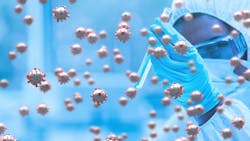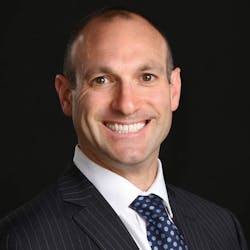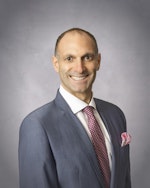A new study published in Science this month analyzed patient immunological memory after COVID-19 infection.1 188 (age range 19–81 years old) individuals with COVID-19 ranging from asymptomatic to severe disease were recruited from multiple sites, attempting to represent the disease severity distribution consistent with COVID-19 cases in the US. Blood samples were taken to measure circulating antibodies, memory B cells, CD8+ T cells, and CD4+ T cells specific for SARS-CoV-2. Samples were measured in patient subjects at a single time point anywhere from six days postsymptom onset (PSO) to eight months PSO.
Although sentiment in the literature suggests that immunity after a SARS-CoV-2 infection may wane after antibody levels decrease, this new study suggests that immunological memory may last longer than previously thought, as the duration of other immunocomplex components can persist leading to longer protection.
Antibodies are the only component of immunological memory that can provide truly sterilizing immunity (wherein the individual cannot become infected). Immunization studies have indicated that circulating neutralization titers of around 200 may provide sterilizing immunity against a relatively high-dose upper respiratory tract (URT) challenge, and neutralizing titers of around 3,400 may provide sterilizing immunity against a very high-dose URT challenge.2 Cross-sectional analysis of SARS-CoV-2 receptor binding domain (RBD) IgG titers from 20–240 days PSO gave an estimated half-life of 83 days. Overall, at five to eight months PSO, a majority of individuals (90%) in this study were positive for SARS-CoV-2 spike and RBD IgG.
Beyond sterilizing immunity, immune responses that confine SARS-CoV-2 to the URT and oral cavity would minimize COVID-19 disease severity to that of a common cold or asymptomatic disease. This is the primary goal of the current COVID-19 vaccine program.
In this study, memory B cells specific for the viral spike protein were detected in almost all COVID-19 cases, with no apparent half-life at five to eight months postinfection. Other studies of memory B cells post–COVID-19 infection report similar findings of long-term immunity.3 This long-term immunity from memory B cells is especially present after vaccination, as demonstrated by smallpox and influenza.4 Memory T cell half-lives observed over six-plus months PSO in this study were four to eight months for CD8+ and three to five months for CD4+ T cells. SARS-CoV-2 T cell memory at six months has also now been reported in a new preprint study showing the promise of T cell memory as a mitigating factor in COVID-19 disease severity.5
These observations are consistent with recent detection of SARS-CoV-1 memory T cells 17 years after the initial infection.6 This optimistic data suggest that T cell memory might reach a more stable plateau, or slower decay phase, beyond the first eight months postinfection and may be stable for very long periods of time.
The authors of this study mentioned a few limitations. First, long-term data beyond eight months with at least three time points per subject would be required for more precise understanding of the kinetics of durability of SARS-CoV-2 antibodies. Second, this study was not sufficiently powered to control for many variables simultaneously. Additionally, circulating memory (in the bloodstream) was assessed without consideration of how local URT immunological memory played a role after a primary infection with SARS-CoV-2.
In summary, this study is very promising as it is the largest study of its kind on acute viral infections. It suggests that six-plus months post–COVID-19 infection, around 90% of the subjects had at least 3/5 immunological memory responses present, and protection against another severe COVID-19 infection can exist. There have been individual case reports showing that reinfections with SARS-CoV-2 can occur.7 However, a new preprint 2,800-person study found no symptomatic reinfections over a four-month window.8 In addition, another preprint 1,246-person study observed no symptomatic reinfections over six months.9
This data bodes well for those who are going to receive the SARS-CoV-2 vaccine or have had a previous COVID-19 infection. Because heterogeneity in the magnitude of adaptive immune responses to SARS-CoV-2 exists, it is possible that a fraction of the SARS-CoV-2–infected population with low immunological memory would become susceptible to reinfection relatively soon. Nevertheless, this data shows that immune memory in at least three immunological compartments was measurable in about 95% of subjects five to eight months PSO, indicating that durable immunity against secondary COVID-19 disease is a possibility in most individuals.
Related reading:
- Vitamin D deficiency and COVID-19
- Lowering the transmission and spread of human coronavirus with over-the-counter products
- How does COVID-19 affect salivary flow and xerostomia?
- Uncontrolled inflammation: The real problem with COVID-19
- Loss of smell and taste: Distinguishing between COVID-19 and the common cold/flu
- Top 5 oral manifestations of COVID-19
- Can periodontal disease be a contributing factor for COVID-19 severity?
Editor’s note: This article originally appeared in Perio-Implant Advisory, a newsletter for dentists and hygienists that focuses on periodontal- and implant-related issues. Perio-Implant Advisory is part of the Dental Economics and DentistryIQ network. To read more articles, visit perioimplantadvisory.com and subscribe at this link.
References
- Dan JM, Mateus J, Kato Y, et al. Immunological memory to SARS-CoV-2 assessed for up to 8 months after infection. Science. 2021;eabf4063. Published online: January 6, 2021. doi:10.1126/science.abf4063
- Mercado NB, Zahn R, Wegmann F, et al. Single-shot Ad26 vaccine protects against SARS-CoV-2 in rhesus macaques. Nature. 2020;586(7830):583-588. doi:10.1038/s41586-020-2607-z
- Rodda LB, Netland J, Shehata L, et al. Functional SARS-CoV-2–specific immune memory persists after mild COVID-19. Cell. 2020;184(1):169-183.e17. doi:10.1016/j.cell.2020.11.029
- Yu X, Tsibane T, McGraw PA, et al. Neutralizing antibodies derived from the B cells of 1918 influenza pandemic survivors. Nature. 2008;455(7212):532-536. doi:10.1038/nature07231
- Zuo J, Dowell A, Pearce H, et al. Robust SARS-CoV-2–specific T-cell immunity is maintained at 6 months following primary infection. BioRxiv. 2020;11(01):362319. Published November 2, 2020. doi:https://doi.org/10.1101/2020.11.01.362319
- Le Bert N, Tan AT, Kunasegaran K, et al. SARS-CoV-2–specific T cell immunity in cases of COVID-19 and SARS, and uninfected controls. Nature. 2020;584(7821):457-462. doi:10.1038/s41586-020-2550-z
- Tillett RL, Sevinsky JR, Hartley PD, et al. Genomic evidence for reinfection with SARS-CoV-2: a case study. Lancet Infect Dis. 2021;21(1):52-58. doi:10.1016/S1473-3099(20)30764-7
- Wyllie DH, Mulchandani R, Jones HE, et al. SARS-CoV-2 responsive T cell numbers are associated with protection from COVID-19: a prospective cohort study in keyworkers. MedRxiv. 2020;11(2):20222778. doi:10.1101/2020.11.02.20222778
- Lumley SF, O’Donnell D, Stoesser NE, et al. Antibodies to SARS-CoV-2 are associated with protection against reinfection. MedRxiv. 2020;11(18):20234369. doi:10.1101/2020.11.18.20234369









